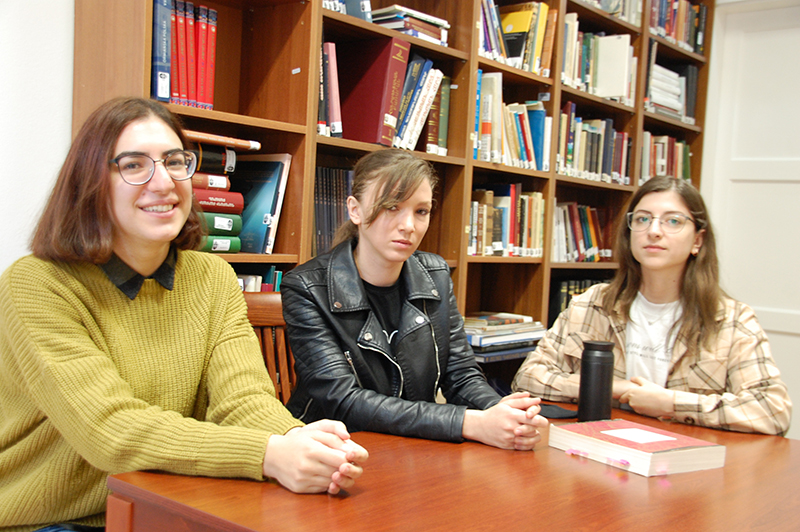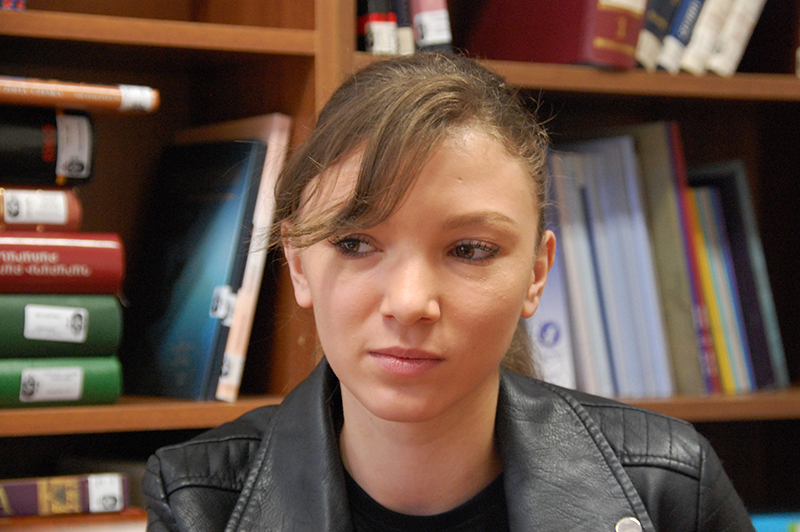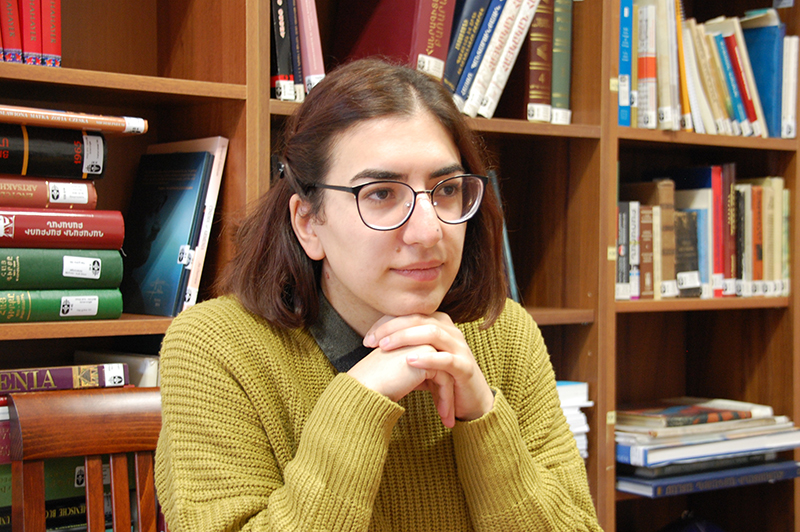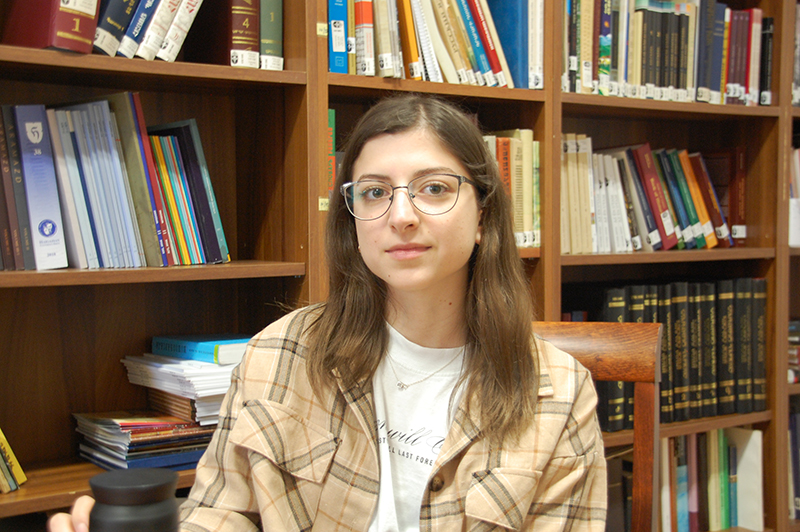Originally, it would have been five Armenian students to study at PPCU in the academic year 2020/2021, but the 2020 Nagorno-Karabakh conflict hindered the male students from leaving their home country.
We met three Armenian women at the Sophianum to talk about the clashes in Karabakh from a very personal point of view.
Our interviewees are:
- Diana Ghazaryan, Yerevan (Yerevan State University, Art History)
- Lilith Mnatsakanyan, Village of Arajadzor (Artsakh University, Translation Studies)
- Kima Saribekyan, Yerevan (Russian-Armenian (Slavonic) University, International Relations)
Thank you very much for sharing your thoughts and feelings with us.
When did you arrive to Hungary?
Lilith & Diana: We arrived not such a long time ago, but we were sent to quarantine for 10 days and so we didn’t have the chance to get acquainted with the country very deeply. Our first impressions are very positive. In the time of the quarantine we felt at home, also because the environment in Piliscsaba resembles quite much to our homeland.
Kima: Well, I already arrived to Hungary in September 2019 and I feel myself pretty comfortable both in Budapest and in Piliscsaba. I decided not to change the dormitory, since I like staying in Piliscsaba.
You came to Hungary to participate in the History MA programme, with specialization in Armenian studies. What kind of expectations do you have for your studies?
Diana: In Hungary I can get a different angle on Armenian history.
The Armenian Studies program will contribute to my personal development, which will help Armenia, when I go back.
Lilith: It will show us, what other people know about Armenia, Armenians in general, and their history. Also, during our stay, we have a chance to present and represent our country.
Kima: Personally, I didn’t have many lessons about Armenian history, because I graduated in a Russian school, so here I learn much more on Armenian history, than in Armenia. The Armenian history has some very sensitive topics for Armenians. People are not able to speak about it calmly. For example, here we read about the Genocide with Elke Hartmann, and we just got another point of view. We could get rid of the emotional part, and then we were able to examine the topic in an objective way.
What kind of or emotions do you experience right now, being far away from your family? The escalation of the 2020 Nagorno-Karabakh conflict is happening right now, and you made the decision to study abroad for quite a while. Not an easy situation…
Lilith: We made our decision to study here before the war broke out. We can do almost nothing at home, and maybe we can do something here.
Diana: We left the country 10 days ago, I felt really guilty. But, it was my choice to study abroad, and the war wasn’t my choice. Also, what could I do if I were in Armenia? I could do some voluntary work to gather stuff and send it to Artsakh, but I couldn’t do too much. I felt, that I must come here to do my best.
Kima: When our parents talked about the Artsakh War of 1990’s it seemed so far in time. And you didn’t feel, what they felt, because they were at our age that time, and they accepted the refugees from Artsakh. Then it’s happening again, but now with our relatives, cousins and friends.
Do you have any relatives or friends who are directly involved in this conflict?
Lilith: Yes, my brother, uncle and father serve in the army. When the situation is a bit better on the front lines, they are able to contact me and my family before they go back to the front lines. My father serves in the reserves, my brother is on front-line duty.
Diana: I have some friends, who serve in the army and I don’t know much about them. I keep in touch of my friend’s girlfriend, who knows more about him. Many of my friends are serving their 2 years military service. I have a distant friend, whose picture I saw on Facebook, there he is laying in a hospital bed, because of his injuries. They publish the list of fallen soldiers, which happens twice a day. You pray every time to not find any familiar name on the list.
How did your everyday's life change since the clashes started in September?
Diana: When the fighting broke out, I was really busy preparing for the trip. I was preparing, when I was rushing to one place from another, I was thinking, what I am doing? There are many places in the city, where people gathered to send help to Artsakh: food and warm clothes. I donated my warm clothes, which didn’t fit into my luggage. Even here I want to do something for them. For example raise awareness about the current situation or to collect some donations.
Lilith: My thinking changed a lot. Before the war, I spent much time on things, which now mean nothing. Before the war, I spent most of my time on my studies, but now it is the number two priority. Before the war, in Martakert region, the people were going to meet each other. The atmosphere was really friendly. Now, no one visits each other, everybody is staying in their homes for safety children and women have fled the region and went to Yerevan. My little brother and sister are in Yerevan with my relatives, whereas my father and mother stayed at home. The people are very kind in our country, shops give food even for free. We help each other in these difficult times.
In your opinion, why are the clashes between Armenians and Azerbaijanis happening just right now? How was the situation like, the years before, is there any difference?
Lilith: Maybe the Azeri political leadership knew about the start of the clashes, before it happened. We didn’t have any idea about it. In the morning we woke up and thought at first, that it was an earthquake. Then a couple of hours later martial law was declared over Nagorno-Karabakh. Maybe the Azeris thought that Armenia would be weak because of the pandemic situation, and they just used this opportunity to attack.
Diana: We had clashes every year previously. I thought it will end like the others, or it will last some days.
Kima: In the past two years Armenian military became stronger, thanks to the reforms which were enacted after the Revolution. When the war broke out Armenians united, like in 2016 during the Four Days War.
Lilith: In 2016 the Azeris didn’t attack civilians, but now they are using drones against towns.
Diana: What really saddens me, that civilians are bombed and young boys of early 20’s are fighting with terrorists. I can’t imagine what is happening there now.
Kima: And this time they are not only attacking Artsakh, but Armenia too. Also I would like to add, that there is an information’s war, where Azerbaijan is using UN Resolutions against Armenia and Artsakh, which is very interesting as they only read those parts, which says something about Artsakh, but it contains parts, which Azerbaijan should comply.
Diana: I want to add that we didn’t attack Azerbaijan and we are fighting for peace. You should ask people with Armenian friends and they can tell you, that we are friendly, peaceful people.
Lilith: I think neither the people of Azerbaijan nor the people of Armenia want this war.
Kima: In Azerbaijan the people are oppressed by their government, they didn’t have free access to the internet and their government didn’t publish the names of their fallen soldiers, so families are kept in the dark. There is a website where Armenians publish the names of fallen Azeri soldiers, the ones whom they can identify, so they can inform their relatives instead of their government
What do you think, what might end this conflict? And how? (Any possible scenarios you could think of?)
Lilith: I am confident it will end with the victory of our soldiers. We are sure that it will end with the victory of Armenia and Artsakh.
Kima: How it will end, well this depends on OSCE, Russia,, Turkey, and the international community. The President of Artsakh called the diaspora to come and fight as another ceasefire — like 30 years ago — will be bad; hundreds of soldiers died for nothing. So, first the international community should recognize the independence of Artsakh and take active participation to fight against terrorism.
What does the Armenian Department of PPCU mean to you, right now, and in regards of these difficult times?
Kima: It is easier to discuss the situation here as the students and the professors know the situation, so there is no need to explain the situation from the beginning. It’s much easier to talk about this, when everybody knows about the situation.
Lilith: In this situation this Department means a lot, because we are so far from our country, but we are here, which serves as Armenia.
Diana: I feel there is a small and caring family here, whom we can relate at any time and can talk to, to share my feelings.
The interview was conducted before 10 November, when Armenia PM signed joint statement with presidents of Russia and Azerbaijan to end war in Artsakh.
The students were interviewed by Ágnes Reviczky-Balogh.






